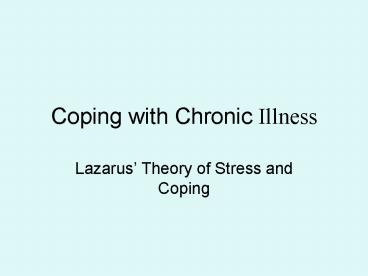Coping with Chronic Illness - PowerPoint PPT Presentation
1 / 22
Title:
Coping with Chronic Illness
Description:
Decreased social, recreational involvement, financial ... Info about resources (support groups, respite services) Lazarus' Theory of Stress and Coping ... – PowerPoint PPT presentation
Number of Views:369
Avg rating:3.0/5.0
Title: Coping with Chronic Illness
1
Coping with Chronic Illness
- Lazarus Theory of Stress and Coping
2
Coping with Chronic Illness
- Nursing role Facilitate achievement of coping
tasks - Coping Tasks
- Maintaining sense of normalcy
- Modifying daily routine, adjusting lifestyle
- Obtaining knowledge and skill for self care
- Maintaining positive self-concept
- Adjusting to altered social relationships
3
Coping with Chronic Illness
- Coping Tasks (cont)
- Grieving over losses associated with chronic
illness - Dealing with role change
- Handling physical discomfort
- Confronting inevitability of death (make most of
life) - Dealing with social stigma of illness/disability
- Maintaining sense of being in control
- Maintaining hope despite uncertain or downward
course of health
4
Family Caregivers
- Family Caregivers
- 21 of caregivers are gt 75 yrs
- Caregivers of elderly with long-term illness
usually - Spouses
- Children (usually daughters, daughters-in-law)
- Other family members
- Outside sources (when needs exceed family
resources)
5
Types of Caregivers
- Care Providers
- perform direct care
- Care Managers
- manage/arrange services to provided by others
- Often have own careers
- Often provide psychosocial support,
transportation, visiting, etc.
6
Impact of Long Term Illness
- Physiologic/Somatic
- Psychologic
- Sexual
- Social
- Occupational
- Financial
7
Impact of Long Term Illness on Families
- Burden
- Decreased social, recreational involvement,
financial difficulties, depression, declining
personal health - May lead to nursing home placement
- Problems related to home care
- Financial
- Competing demands
8
Impact of Long Term Illness on Families
- Physical Strain
- Lifting, 24/7 physical care, sleep deprivation,
chronic fatigue - Emotional Strain
- High incidence of stress-related disorders (HTN,
heart disease) - Manifested as anxiety, anger, guilt, loss of self
- Could lead to elder abuse
9
Impact of Long Term Illness on Families
- Role Changes Associated with Caregiving
- Pre-existing relationships change
- Take on new duties
- Role Ambiguity
- Taking on of new roles (eg. roles traditionally
fulfilled by spouse) - Role Reversal
- Children caring for parents
10
Nursing Interventions for Family Caregivers
- Encourage verbalization and acceptance of
negative emotions - Facilitate Realistic expectations re
- clients illness and expected course
- Own limitations
- Common feelings
- Encourage to accept assistance from others
- Info about resources (support groups, respite
services)
11
Lazarus Theory of Stress and Coping
Pschological Stress
Cognitive Appraisal
Health Outcome
- Coping
12
Lazarus Theory of Stress and Coping
- Stress
- Relationship b/w person and environment that is
appraised by the person as - Taxing or exceeding his/her resources
- Endangering his/her well-being
13
Lazarus Theory of Stress and Coping
- Cognitive Appraisal
- Process through which person evaluates whether a
particular encounter with the environment is
relevant to his/her well-being and if so, in what
way(s) - i.e., evaluation of the significance or meaning
of an event to the individual
14
Lazarus Theory of Stress and Coping
- Two Types of Cognitive Appraisal
- Primary Appraisal
- Person evaluates whether he/she has anything at
stake (i.e., is there potential harm or
benefit?). - Evaluates significance of the event with
respect to well-being - Types of appraisal
- Stressful harm, loss, threat
- Challenge opportunity for growth, gain or
mastery
15
Lazarus Theory of Stress and Coping
- Secondary Appraisal
- Evaluates what if anything can be done to
overcome or prevent harm or to improve the
prospects of benefit (ie., evaluates coping
resources and options) - Various coping options (e.g., altering the
situation, accepting it, seeking information) are
evaluated
16
Lazarus Theory of Stress and Coping
- Coping
- Persons constantly changing cognitive and
behavioral efforts to manage specific external
and/or internal demand that are appraised as
taxing or exceeding the persons resources - i.e., efforts to master the demands
17
Lazarus Theory of Stress and Coping
- Two major types of coping strategies
- Emotion-focused coping
- Used to control distressing emotions, sometimes
by altering the meaning of an outcome - Likely to be used in situations that are
perceived not be not amenable to change - Problem-focused coping
- Used to control the troubles person-environment
relationship through problem-solving,
decision-making and/or direct action - More likely to be used in situations perceived as
changeable
18
Alterations in Health Role of the Nurse(Bevis)
- Nursing
- A process
- Purpose - promote optimal health facilitate
maturation and adaptation in clients (individuals
intrapersonal, groups interpersonal
community)
19
Nursing System (Bevis)
- Input
- Needs, goals problems desires of clients
- Includes assessment data
20
Nursing System (Bevis)
- Throughput
- Theories, concepts, processes used
- Tools used
- Problems-solving/decision-making (critical
thinking) - Caring
- Teaching/Learning (Educator)
- Communication
- Management/change (change agent)
21
Nursing System (Bevis)
- Output
- Behaviors, services, roles, functions of nurses
22
Life Tasks (Bevis)
- Stress
- Forces that press in upon or noxiously stimulate
the individual. e.g. health problems, medical
diagnoses, social problems - Strain
- Expresses itself in symptoms, signs or behaviors
that signal response to stress. E.g., S/S of an
illness physical assessment findings, behaviors
(crying) - Maturation
- Process of human development
- Adaptation/Maladaptation
- Coping patterns or ways of behaving that can
head to an interruption or maintenance of health

